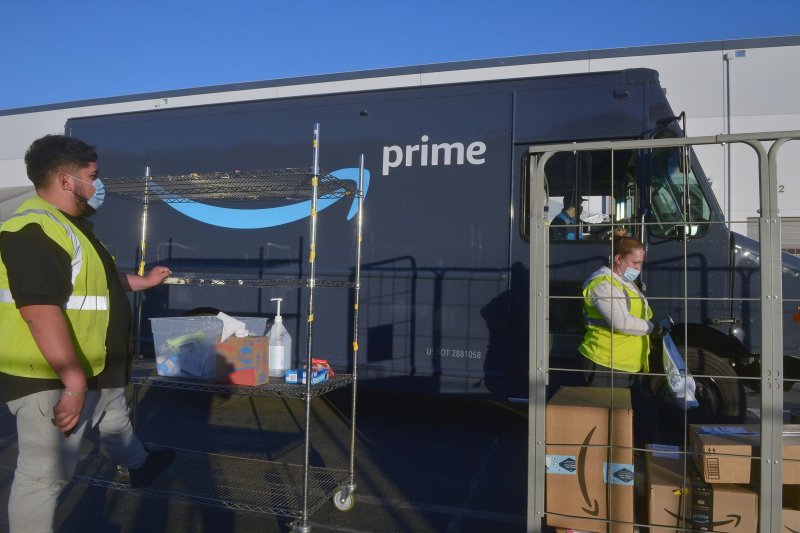The U.S. Federal Trade Commission filed a lawsuit against the online retail giant Amazon (pictured in Hawthorne, Calif., in 2020) on Tuesday, saying the company illegally maintained "monopoly power" leading to inflated prices. File Photo by Jim Ruymen/UPI |
License Photo
Sept. 26 (UPI) -- The U.S. Federal Trade Commission filed a lawsuit against the online retail giant Amazon on Tuesday, alleging the company illegally maintained "monopoly power" leading to inflated prices.
The FTC was joined in the 172-page lawsuit by the attorneys general for 17 states in what has become the federal government's biggest challenge to Amazon's power.
The company, which began as an online bookstore founded by Jeff Bezos in 1994, has grown into a logistics powerhouse that effectively forced the U.S. Postal Service to deliver on Sundays and has even become a dominant player in cloud computing and artificial intelligence.
"The early days of online trade were bursting with possibility. Competition flourished. A newly connected nation saw a wide-open frontier where anyone with a good idea would have a fair shot at success," the lawsuit reads.
"Today, however, this wide-open frontier has been enclosed. A single company, Amazon, has seized control over much of the online retail economy."
Much of the lawsuit is redacted, such as the revenue from Amazon's ad sales, and other information.
But the lawsuit outlines what it says are methods in which Amazon "exploits its monopoly" in ways that harm consumers. The suit uses numerous screenshots of products sold on Amazon to document those methods.
"For example, Amazon has hiked so steeply the fees it charges sellers that it now reportedly takes close to half of every dollar from the typical seller that uses Amazon's fulfillment service. Amazon recognizes that sellers find 'that it has become more difficult over time to be profitable on Amazon' due to Amazon's [redacted]," the lawsuit reads.
"But as one seller explains, 'we have nowhere else to go and Amazon knows it.'"
The company is accused of using tactics including anti-discounting measures to punish sellers that offer prices lower than Amazon, resulting in higher prices for products across the Internet.
"Another form of punishment is to bury discounting sellers so far down in Amazon's search results that they become effectively invisible," the lawsuit reads. "Still another is [redacted]."
Amazon even uses its algorithm to deter other online stores from offering lower prices, which has "worked just as [redacted] envisioned," the suit states.
The company also conditions sellers' ability to obtain Prime eligibility for their products, which the FTC called a "virtual necessity for doing business on Amazon."
"Amazon caught a glimpse of this alternative universe when it temporarily relaxed its coercive conduct," the lawsuit reads.
"As Amazon recognized, this decision was immediately popular with both shoppers and sellers. But internally, [redacted] that would threaten Amazon's monopoly power."
The FTC and its partner states are seeking a permanent injunction to prohibit Amazon from engaging in what the federal agency called "unlawful conduct."















